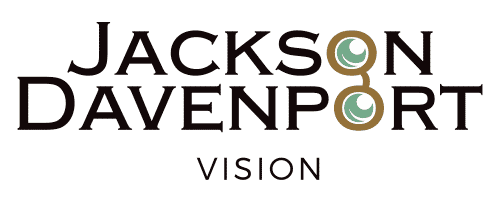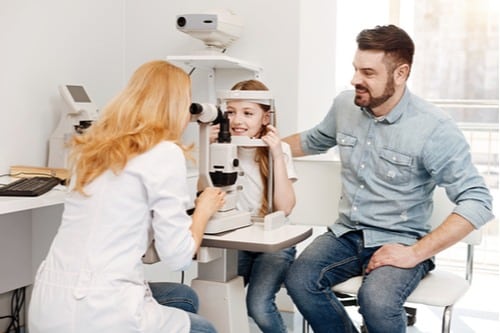Sighted people use vision for approximately 80% of their learning. Good eyesight and the ability to perform various visual tasks effectively are vital to a child, and it is crucial to developing their academic knowledge, sports ability, and social life.
Kids spend a significant portion of their lives in classrooms, reading, writing, and reading off whiteboards; all these activities need good vision. We at Jackson Davenport have an eye care center where you can get your child’s eyesight tested by experienced optometrists.
What Are the Less Frequently Heard Of Vision Problems?
If a child has vision problems other than nearsightedness, likely, they won’t be diagnosed. Some of these problems include:
- Poor hand-eye coordination
- Poor visual perception
- Color blindness
- Farsightedness
- Issues with binocular vision such as teaming, focusing, and tracking
Kids with any of these problems can find it challenging and less enjoyable to manage these straightforward tasks at school. Adults with eyesight problems can describe the issue to people around them. However, that isn’t the case with kids.
If they have trouble with visual tasks while at school, they might not think they have a vision problem and may believe that learning isn’t enjoyable or that they aren’t intelligent enough to attend school. Unfortunately, many adults underscore this belief because there are several commonalities between vision problems and learning disorder symptoms.
Which Different Eye Problems Do Kids Typically Have?
Parents or guardians often misdiagnose these issues. They believe that their child has a learning disorder and do not take them to an eye doctor for an eye exam. Apart from farsightedness, nearsightedness, and astigmatism, some common vision problems children have, include:
- Lazy Eye – In amblyopia/lazy eye, the child’s one eye is far weaker than the other. Sometimes, there is a decrease in vision in both eyes without any noticeable anatomic damage. The unfortunate part is that contact lenses or eyeglasses do not always correct this problem; the eye doctor may suggest eye patching as a remedy to strengthen and improve sight in the weaker eye.
- Convergence Insufficiency– In this vision problem, the child cannot maintain eye alignment when viewing nearer objects. The issue can cause double vision or eye discomfort when reading.
- Strabismus (misalignment of eyes)– There can be several different causes for misaligned or crossed eyes, including muscle control problems in the affected eye/eyes. This condition commonly causes amblyopia and must be treated when the child is very young to help the eye teaming skills and vision to develop normally.
- Color Blindness, Focusing Problems, And Poor Depth Perception- The eye doctor may also test the child’s accommodation (focusing ability), color vision, depth perception, and more.
- Eye Health-Related Problems– The eye doctor will examine the child’s eyelids to look for abnormalities or signs such as swelling, eye discharge, bumps, or infected eyelash follicles. They will also examine the lens, cornea, and iris to look for irregularities such as cloudiness (opacities), etc.
Why Are Children’s Eye Exams Important?
Eye exams for children are crucial to ensure they do not have any vision problems and have healthy eyes. Vision-related issues can affect your child’s academic performance and potentially their safety. The other reason why early eye exams are essential is that kids require these skills for optimal learning:
- Accurate eye movement skill
- Excellent visual acuity at varying distances
- Improve your kid’s ability to learn
- Comfortable and accurate eye teaming skills
When Should Your Child have Eye Exams?
Eye exams need to be done at specific ages:
- You must take your child for a first comprehensive eye exam when they are six months of age.
- The next examination needs to be at age 3
- After that, you must do the eye test at age 5 or 6
School-aged kids must have their eye exam every two years if they do not need any vision correction. Kids that need contact lenses or eyeglasses should be examined each year or as the eye doctor recommends.
What Are The Common Symptoms Of Eye Problems?
A problem like an eye pointing in the wrong direction is not difficult to spot. However, most of the symptoms are not as obvious. Several subtler symptoms can indicate undiagnosed eye problems, such as:
- A habit of covering only one eye while reading
- Trouble completing schoolwork
- Short attention span (especially when it involves close-up work)
- Frequent blinking and eye rubbing
- Fidgeting
- Reading comprehension difficulty
- Frequent headaches
Even if all these symptoms seem linked to learning disorders, it’s a good idea to visit an eye doctor for an eye exam to rule out vision issues.
An Eye Exam at the Right Time is Important
Addressing eye problems in time and treating them can prevent them from escalating and affecting your child’s activities, education, and social life. Depending on the issue, the eye doctor may recommend visual therapy, eyeglasses, or other treatments. Consult a skilled and certified eye doctor and get a detailed eye exam for your kid. It will help rule out lesser-known eye issues that a school nurse will conduct a basic vision test.
For most eye care patients, contact lenses are an easy and convenient option for vision correction. Our optometrists are trained to provide high-quality contact lenses and eyeglasses and ensure they are perfect for the patient.
The eye exams we conduct help evaluate your child’s visual acuity while examining their complete eye health. Annual exams are an excellent way to protect your kid’s eyes and treat any problems before they get out of hand. Timely treatment of even the slightest vision issues will ensure that your child learns better and is more comfortable and confident in social settings.
As mentioned earlier, most vision and eye problems do not have specific or apparent symptoms and go unnoticed. However, our licensed optometrists can quickly diagnose them and will prescribe suitable eyeglasses for your child. For more information, please call us at 843-871-9750 or your queries using this Online Form. We conduct eye exams at our state-of-the-art eye care center and have a wide range of glasses and contact lenses to choose from.

